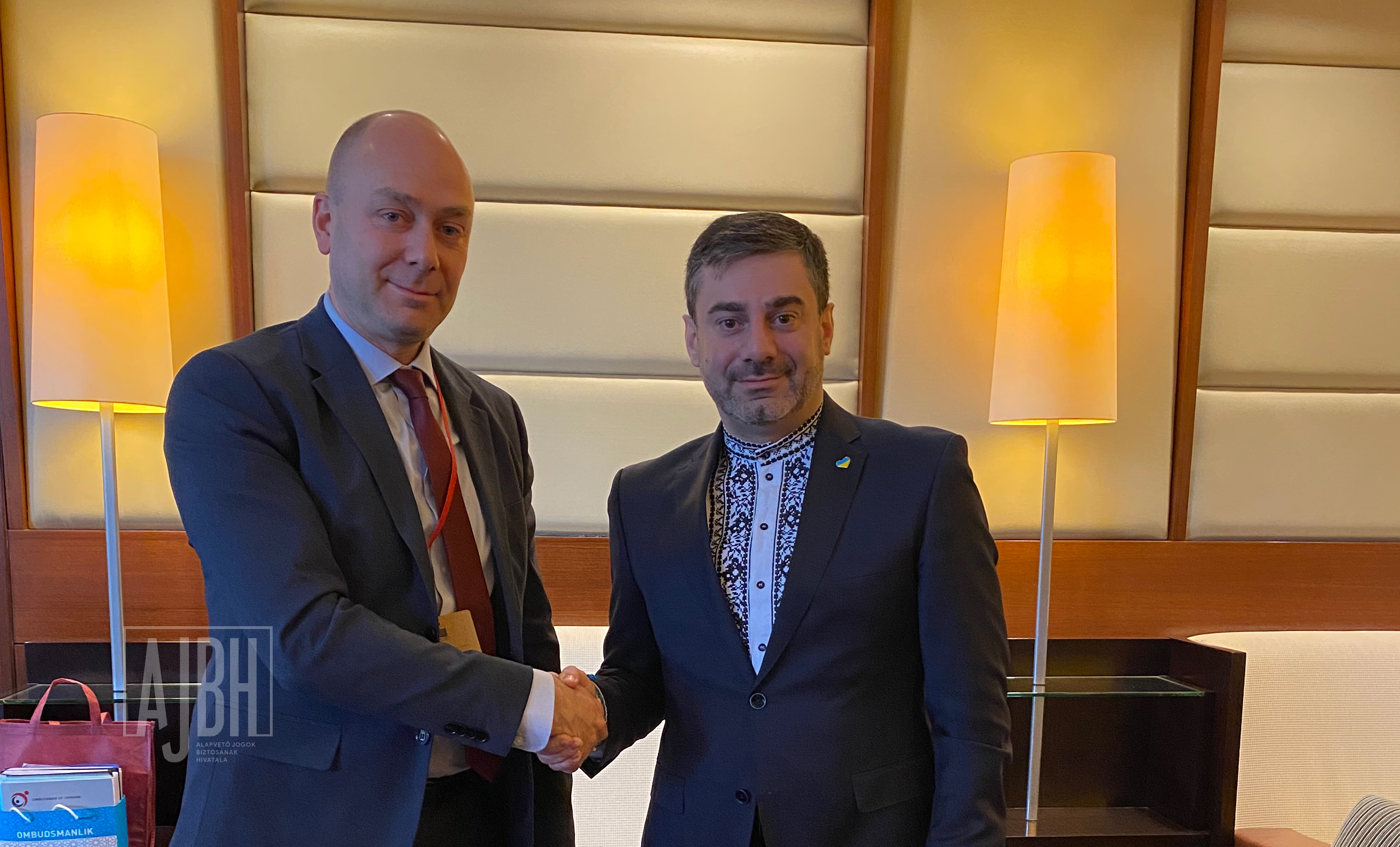DR. ÁKOS KOZMA MEETS WITH UKRAINIAN OMBUDSMAN - AJBH-EN
Prof. Dr. Máté Szabó
 Prof. Dr. Máté SZABÓ
Prof. Dr. Máté SZABÓ
Commissioner for Fundamental Rights, Hungary
CURRICULUM VITAE
He was elected by the Hungarian Parliament as the Parliamentary Commissioner for Civil Rights for
six years which position he had hold from 26.09.2007. He continues his role and stands as the general
ombudsman of Hungary. From 1st January 2012, Prof. Szabó is Commissioner for Fundamental Rights.
He received his law degree at the Eötvös Loránd University, Faculty of Law in Budapest in
1980 and got a job as a journalist. From 1984, he worked as a scientific associate in the Political
Science Department of the Eötvös Loránd University's Faculty of Law. From 1990, as an associate
professor. He defended his PhD. on social movements in 1987, and got the ‘Doctor of the Political
Science' title from the Hungarian Academy of Science in 1996.
He is a founding member of the Hungarian Political Science Association and the Hungarian
Humboldt Association; furthermore, he is an active member of the Political Science Committee of
the Hungarian Academy of Science and several international associations related to sociology and
political science.
Since 1980, he has continuously carried out several project researches on various subjects of political
and social sciences.
• Between 1991-2007, he was a fellow of the Alexander von Humboldt Foundation in
Hamburg, Berlin, Bremen, Mainz and Frankfurt an der Oder in Germany.
• He was a visiting fellow of the Netherlands Institute of Advanced Studies, Wassenaar, in
1995.
• In 2000, he was a research fellow at the European University Institute in Florence, Italy.
He is specialized in civil society, social movements and political protest and the theory of law and
politics as well. He published more than 300 scientific contributions in Hungarian, English and
German. He is a regular participant at conferences in political science, law, and political sociology
in Europe and around the world. He teaches political science and European studies. Since he was
elected ombudsman, he is an active member of the International Ombudsman Institution and the
European Network of Ombudsman and board member of the European Ombudsman Institute.
Awarded:
• The ‘Erdei Ferenc Prize' of the Hungarian Sociological Association for young talents in 1988.
• The memorial medal ‘For Hungarian Higher Education' of the Ministry of Education for his
teaching career in 2006.
• The ‘István Bibó-Prize' of the Hungarian Political Science Association in 2007, as an
acknowledgement of his life work.
• The Gold Cross of Merit awarded by the President of Poland in 2012, in recognition of his
merits in strengthening human rights and developing Polish- Hungarian relations in this field.
Born in 1956 (13.06.), Budapest-Hungary. Married, and father of two children.
Publications on foreign languages (2007-)
1) Books
Human Rights and Civil Society in Hungary . Twenty Years for Rights and Freedom (1988-2008). OBH,
Budapest, 2009.
2) Studies in volume
Partizipation und Zivilcourage- die neue Ungarn jenseits des Autoritarismus in: Aron Buzogany-Rolf
Frankenberg (Hrsg.): Osteuropa: Politik, Wirtschaft und Gesellschaft. Nomos, Baden-Baden, 2007.
277-291.
Collective Protests in Central European Post-Communist Countries, in: Pero Mladini-Davorka Vidovic
(eds.): Transitions in Central and Eastern European Countries, CPI, Zagreb, 2007. 93-117.
1968 in Hungary, in: Martin Klimke-Joachim Scharloth (ed.): 1968 in Europe. A History of Protest and
Activism, 1956-1977. Palgrave, New York, 2008. 219-229.
(-Kerényi Szabina): Transnational Influences on Patterns of Mobilisation Within Environmental
Movements in Hungary, in: Brian Doherty-Thimothy Doyle (eds.): Beyond Borders. Environmental
Movements and Transnational Politics.Routledge: New York, 2008. 107-125.
Die Zivilgesellschaft Ungarns in einer vergleichenden Perspektive, in: Anton Sterbling (Hrsg.):
Zivilgesellschaftliche Entwicklungen in Südosteuropa. O. Sagner, München, 2009. 205-239.
Kompromiss als Erbe des Kádárismus: Ungarn 1989-1990, in: Jerzy Macków (Hrsg.): Autoritarismus in
Mittel- und Osteuropa. VS Verlag, Wiesbaden, 2009. 199-215.
The Hungarian Ombudsman Institution (1995-2008), in: Linda C. Reif. (eds.): The International
Ombudsman Yearbook. Martinus Nijhoff Publ. Leiden/Boston, 2009.154-182.
Das Wesen von Ungehorsam und Kritik. Ombudsmann-Institution, die osteuropäische Revolution
der Menschenrechte und eine neue Zivilkultur, in: Bálint Balla-Anton Sterbling (Hrsg.): Europäische
Entwicklungsdynamik. Krämer Verlag.Hamburg, 2009. 87-107.
Milestones in the global and European development of human rights, in: Jernej Rovsek/Liana
Kalcina(eds.): 60th Anniversary of the Universal Declaration of Human Rights and the 15th
Anniversary of the Human Rights Ombudsman Act in Slovenia. The Human Rights Ombudsman of
Slovenia, Ljubljana, 2009.88-94.
Demonstration Democracy in Hungary, in: Armen Harutyunyan(eds.): Freedom of Expression-Right to
Fair Trial.Almanac, Erevan(Armenia) 2010. 38-55. in Russian: 214–233; in Armenian: 123–146.
Demokratija Demonstraciji v Vengrija, in: Armen Harutyunyan(ed.): Almanah: Szvabodna
Vürazsenyija Mnenyija. Erevan(Armenia) oroszul 2010.214-233. Uo. örményül 123-146.
Gab es eine politische Ethik der Wende- und wäre diese heute noch gültig? In: András Masát(hrsg.):
Ethik und Alltag. Zwischen Wahrheit und Wirklichkeit. Andrássy Univ.Abhandlungen Nr. 23. 2010.
Budapest, 29-57.
Revisionismus, Liberalismus und Populismus: die Oppositionn in Ungarn, in: Detlef Pollack-
Jan Wielghos (hrsg.): Akteure oder Profiteure? Die demokratische Opposition in den
ostmitteleuropäischen Regimeumgbrüchen 1989.WS-Verlag, Wiesbaden, 2010. 63-83.
Zwischen Reform und Revolution. Ungarns Weg aus der Staatssozialismus-wohin? In: Th.
Grossbölting-Raj Kollmorgen u.a.(Hrsg.): Das Ende des Kommunismus. Die Überwindung der
Diktaturen inn Europa und ihre Folgen. Klartext, Essen, 2010.177-195.
The Hungarian Ombudsman Institution, in: S. Rashidova(ed.): World Ombudsmen. Y-M.M. Publ.
Tashkent, 2010. 58-74.
Defizite der Demokratie oder Machtausübung mit Defiziten? Probleme der Kundgebungen und des
Versammlungsrechts in Ungarn, in: Joachim Jesko von Puttkamer-Gabriele Schubert(Hrsg.): Kulturelle
Orientierungen und gesellschaftliche Ordnungsstrukturen in Südosteuropa. Harrassowitz Verlag,
Wiesbaden, 2010. 221-239.
Ungarn hat gewahlt – aber wie? In: Berliner Debatte/Initial 2010/2. 67–73. (– Sziklay Julia): Die
Institution des Ombudsmanns in den deutschssprachigen; LanderHumboldt-Nachrichten, 2010. No.
32. 11–20.
3) Studies in Journals
Legal and Political Environment of NGO's in Hungary , in: : Annales Universitatis Scientarium
Budapestinensis de Rolando Eötvös Nominate . Sectio Iuridica. Vol. XLIX.2008.23-55.o.
Civil and Uncivil Society in Hungary, in: Central European Political Science Review 2008./33.66-87.
A Transnational Civil Society in Europe: from the point of view of the new post-communist EU-
members, in: Central European Political Science Review Vol. 9. No. 34.2008. 61-94.
Urbanisten versus Populisten in Ungarn, in: Berliner Debatte/Initial 2009/3. 67-74.o.
Disobedience and Criticism. in: Jura 2009/2. 175-185.
Unprotected? Who guards the guardians, in: European Ombudsman Newsletter 2009/12. 58-61.o.
Related to the Tradition of the Extreme Right- Down by Law in the Post-Communist Democracy, in:
Annales 2009/253-277.
The Ethos of Ombudsman's Institution, in: Journal für Rechtspolitik 2010/1. 12-21.o.
Press releases
null DR. ÁKOS KOZMA MEETS WITH UKRAINIAN OMBUDSMAN
DR. ÁKOS KOZMA MEETS WITH UKRAINIAN OMBUDSMAN

At the bilateral meeting, the Ombudsman, among others, gave an account of the direct legal and humanitarian support provided to the Ukrainian refugees by the Office of the Commissioner for Fundamental Rights. Furthermore, Dr. Ákos Kozma informed the Ukrainian Ombudsman of the operation and experience of the information points operated by the Office of the Commissioner for Fundamental Rights at the Záhony railway station, in Beregsurány and at the Budapest-based BOK Sports Hall.
The Commissioner for Fundamental Rights of Hungary took part in an international ombudsman conference in Turkey.
The photos displayed at www.ajbh.hu are owned by the Office of the Commissioner for Fundamental Rights. All rights reserved.

